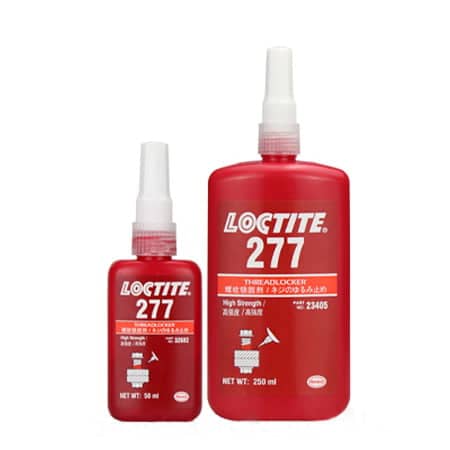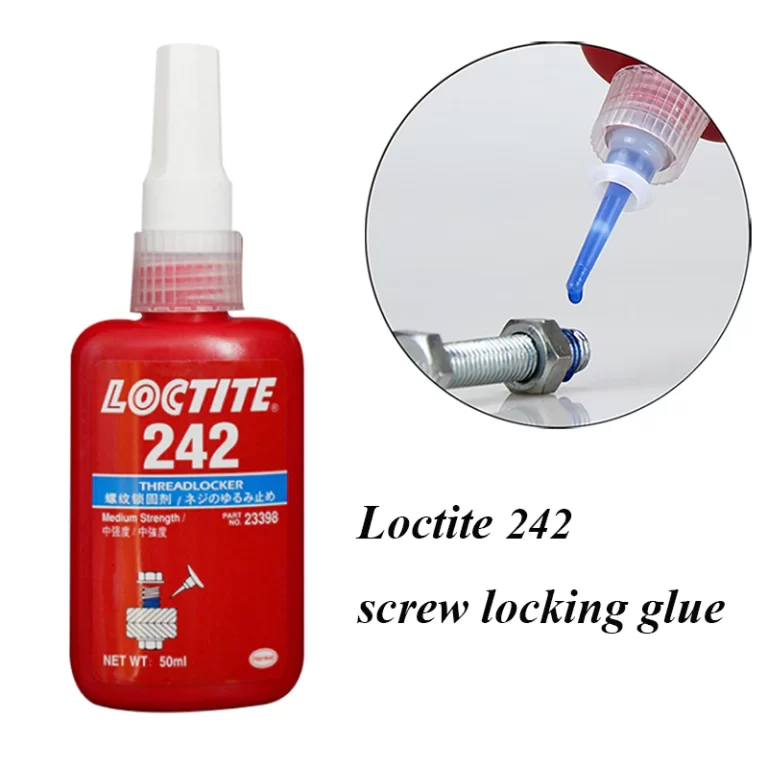Loctite 277 vs 271 – Detailed Comparison
Loctite 277 and Loctite 271 are both threadlockers made by the brand Loctite. They are designed to secure threaded fasteners and prevent loosening due to vibration and temperature changes.
Loctite 277 is a high-strength, permanent threadlocker for larger diameter bolts, screws and nuts. It is ideal for applications where disassembly is not required and provides a strong, permanent bond that can withstand high temperatures and harsh environments.
Loctite 271, on the other hand, is a medium-strength, removable threadlocker that is ideal for applications where disassembly is required. It provides a secure bond but can be easily disassembled using standard tools. It is also resistant to high temperatures, making it ideal for use in industrial settings.
Both Loctite 277 and Loctite 271 are designed to provide a reliable, long-lasting bond and are ideal for use in a variety of applications, including automotive, aerospace, and manufacturing industries. However, the choice between the two depends on the specific requirements of the application, such as the need for a permanent or removable bond, and the strength and durability required.
Recommended :- Comparison of Loctite 271 vs 242
Loctite is a brand of adhesives and sealants made by Henkel AG & Co. KGaA, a German chemical and consumer goods company. The Loctite brand offers a variety of adhesives, including super glue, epoxy, and thread locker, for both household and industrial applications. Some of their popular products include Loctite Super Glue, Loctite Epoxy, and Loctite Threadlocker. These adhesives are known for their strong and fast-acting bonding abilities, making them useful for a variety of projects.
Loctite 277 Review
Loctite 277 is a high-strength, permanent threadlocking adhesive made by the brand Loctite. It is designed to secure threaded fasteners and prevent loosening due to vibration and temperature changes.
One of the main benefits of Loctite 277 is its strength. It provides a secure, permanent bond that can withstand high temperatures and harsh environments, making it ideal for applications where disassembly is not required. The bond strength is achieved by curing to a tough, resilient plastic that fills the entire joint and locks the threads together.
Another benefit of Loctite 277 is its versatility. It can be used on a variety of metal surfaces, including steel, stainless steel, and aluminum, and can be used on bolts and screws with a diameter range of 1/4″ to 3/4″. This makes it suitable for a wide range of applications, from automotive to aerospace to manufacturing.
Application of Loctite 277 is simple and straightforward. It is applied directly to the threads of the fastener and allowed to cure for 24 hours. After curing, the bond is strong and permanent, and the fastener can be tightened to its desired torque without fear of loosening.
One potential drawback of Loctite 277 is that it is not easily removed once cured. This makes it ideal for applications where disassembly is not required, but may not be suitable for applications where disassembly is needed.
Overall, Loctite 277 is a highly effective, versatile, and reliable threadlocking adhesive. Its high strength and resistance to high temperatures and harsh environments make it ideal for applications where a permanent bond is desired.
Pros of Loctite 277:
- Provides a strong and permanent bond.
- Resistant to high temperatures and harsh environments.
- Versatile and can be used on a variety of metal surfaces.
- Simple and straightforward application.
- Suitable for a wide range of applications, including automotive, aerospace, and manufacturing.
Cons of Loctite 277:
- Not easily removed once cured.
- May not be suitable for applications where disassembly is required.
- May require special tools or techniques for removal if necessary.
- May not be suitable for small diameter fasteners or delicate components.
In conclusion, Loctite 277 is a highly effective threadlocking adhesive for applications where a permanent bond is desired, but its permanent bond may not be suitable for all applications and removal can be difficult if needed.
Loctite 271 Review
Loctite 271 is a medium-strength, removable threadlocking adhesive made by the brand Loctite. It is designed to secure threaded fasteners and prevent loosening due to vibration and temperature changes, while still allowing for disassembly if necessary.
One of the main benefits of Loctite 271 is its removable feature. Unlike permanent threadlockers, Loctite 271 can be easily disassembled using standard tools, making it ideal for applications where disassembly is required. This also makes it a more versatile option for applications where the fastener may need to be adjusted or removed at a later time.
Another benefit of Loctite 271 is its resistance to high temperatures. It can withstand temperatures up to 150°C, making it suitable for use in industrial settings where high temperatures are a concern.
Application of Loctite 271 is simple and straightforward. It is applied directly to the threads of the fastener and allowed to cure for 24 hours. After curing, the bond is secure and prevents loosening, but can still be easily disassembled if necessary.
One potential drawback of Loctite 271 is its medium strength. While it provides a secure bond, it may not be as strong as permanent threadlockers and may not be suitable for applications with high loads or vibration.
Overall, Loctite 271 is a highly effective and versatile threadlocking adhesive. Its removable feature and resistance to high temperatures make it ideal for applications where disassembly may be required and where high temperatures are a concern.
Pros of Loctite 271:
- Allows for disassembly if necessary.
- Resistant to high temperatures.
- Simple and straightforward application.
- Suitable for a wide range of applications, including automotive, aerospace, and manufacturing.
- Can be easily disassembled using standard tools.
Cons of Loctite 271:
- Has medium strength, may not be suitable for high load or vibrating applications.
- May not provide as strong a bond as permanent threadlockers.
- May not be suitable for applications where a permanent bond is desired.
In conclusion, Loctite 271 is a highly effective and versatile threadlocking adhesive for applications where disassembly may be required and where high temperatures are a concern. Its removable feature is a major advantage, but its medium strength may limit its use in some high load or vibrating applications.
Differences between Loctite 277 & Loctite 271
Loctite 277 and Loctite 271 are both threadlocking adhesives produced by Loctite, but they have some important differences:
Strength
Loctite 277 provides a high-strength, permanent bond, while Loctite 271 provides a medium-strength, removable bond.
Removability
Loctite 277 forms a permanent bond and cannot be easily disassembled, while Loctite 271 can be easily disassembled using standard tools.
Temperature resistance
Both adhesives can withstand high temperatures, but Loctite 271 is slightly more heat-resistant, with a maximum temperature resistance of 150°C, compared to 120°C for Loctite 277.
Versatility
Both adhesives can be used on a variety of metal surfaces, including steel, stainless steel, and aluminum, but Loctite 277 is designed for bolts and screws with a diameter range of 1/4″ to 3/4″, while Loctite 271 can be used on a wider range of diameters.
Application
Both adhesives are applied directly to the threads of the fastener and allowed to cure for 24 hours.
In conclusion, Loctite 277 and Loctite 271 are both highly effective threadlocking adhesives, but they have different strengths and applications. Loctite 277 is ideal for applications where a permanent bond is desired and disassembly is not required, while Loctite 271 is ideal for applications where disassembly may be required or where high temperatures are a concern.
What Loctite is the strongest from 271 and 277?
Of the Loctite 271 and Loctite 277 adhesives, Loctite 277 is considered to be the stronger option. It provides a high-strength, permanent bond and is suitable for applications where disassembly is not required. Its high strength and resistance to high temperatures and harsh environments make it ideal for use in industrial and manufacturing applications. In comparison, Loctite 271 provides a medium-strength, removable bond and is suitable for applications where disassembly may be required or where high temperatures are a concern.
How long does Loctite 277 take to cure?
Loctite 277 takes 24 hours to fully cure and reach its maximum strength. It is important to allow the adhesive to cure for the full 24 hours before exposing it to vibration, shock, or high temperatures, as this can impact the bond strength. In addition, it is also important to follow the recommended application procedures and allow the adhesive to dry completely before using the fastener. By allowing Loctite 277 to cure properly, you can ensure a strong and secure bond that will last for a long time.
Final Thoughts
In conclusion, Loctite 277 and Loctite 271 are both highly effective threadlocking adhesives produced by Loctite. They each have their own strengths and applications, and the choice between them will depend on the specific needs of the application.
Loctite 277 provides a high-strength, permanent bond and is suitable for applications where disassembly is not required. It is also resistant to high temperatures and harsh environments, making it ideal for industrial and manufacturing applications.
On the other hand, Loctite 271 provides a medium-strength, removable bond and is suitable for applications where disassembly may be required or where high temperatures are a concern. Its removable feature makes it a more versatile option for applications where the fastener may need to be adjusted or removed at a later time.
In both cases, the adhesives are simple and straightforward to apply, and they provide a secure bond that helps to prevent loosening due to vibration and temperature changes. Whether you choose Loctite 277 or Loctite 271, you can be confident that you are using a highly effective threadlocking adhesive that will meet your needs.


